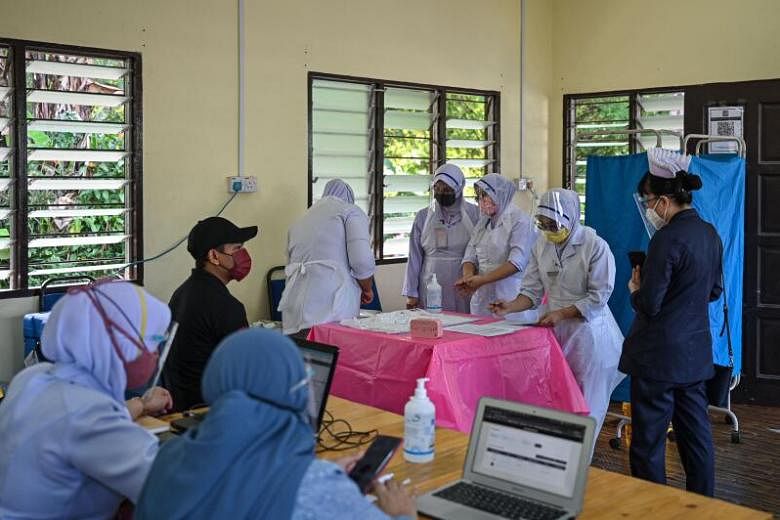KUALA LUMPUR - Covid-19 treatment centres and hospitals in Malaysia face the prospect of disruptions on Monday (July 26), as thousands of junior doctors are set to go on strike.
They are walking off their jobs over demands for permanent employment and other benefits, which they say have not been met by the government despite an offer by Prime Minister Muhyiddin Yassin on Friday to extend and broaden their employment terms.
Hartal Doktor Kontrak (HDK), which translates to Contract Doctors' Strike - a group that has been organising the strike for weeks while negotiating with the government - has warned hospitals and state health departments of the impending strike which could involve up to 20,000 doctors, many of whom are at the front line of the battle against Covid-19.
"Contract doctors in Malaysia have agreed to participate in this strike to express their dissatisfaction with how the issue is being handled today," HDK said in an undated letter seen by The Straits Times. It is believed to have been sent to hospitals and health departments on Thursday.
The majority of junior contract doctors in Malaysia are sent to Covid-19 treatment centres and hospitals, and HDK called on them to arrange for adequate replacements next Monday.
Tan Sri Muhyiddin on Friday offered a two-year extension for Malaysia's contracted healthcare workers, and also said paid study leave, previously not available, will be provided to them.
However, HDK said that the strike will proceed, after calling the offer "half-baked". The group is pushing for contract doctors to get permanent postings, which come with better salaries and also postgraduate and specialist paths to advance their careers.
In mid-July, the junior doctors took part in a "Black Monday" campaign in which they went to work dressed in black to register unhappiness with their poor employment terms, an issue that dates back to 2016.
It appears that matters have since deteriorated. Dozens of junior doctors resigned with 24-hour notice in the days leading up to the strike, citing burnout as Covid-19 admission rates at hospitals throughout the country hit record highs, overwhelming the health system.
On Friday, Selangor health chief Dr Sha'ari Ngadiman said that 163 doctors have quit the public healthcare system in Selangor alone since January this year, citing multiple factors including burnout.
HDK has said that the doctors are being asked to work for extended hours with no extra pay, and were barred from taking up locum work at vaccination centres run by the private sector.
Led by several contract doctors, HDK warned on its social media platforms that Malaysia's healthcare system was showing signs of failing, with the lack of space at hospitals for patients coupled with doctors quitting.
"The doctors' rights are for the people's rights," it said on its Twitter account on Thursday.
Junior doctors who join the public healthcare system after 2016 have been offered only contracted positions, which have been periodically extended. Malaysian medical graduates need to serve at least 4½ years in the public healthcare system before they can switch to private practice.
The contracted positions involve lower salaries compared with those of permanent doctors. They are also not entitled to the slew of benefits extended to civil servants.
Aside from job security, the doctors are also denied a viable pathway to become specialists in their field of choice, as the government provides paid study leave benefits for permanent doctors only.
Those who quit the public health system to pursue their Master's at their own expense also face difficulty in getting the required placement at specialist departments in the public health system which would enable them to complete their course and become specialists.
The contract doctors received only a marginal pay hike this year after the government revised their civil service salary grade amid the Covid-19 crisis. Previously, their starting pay was RM2,947 (S$950) a month, and this was raised to RM3,611 a month. Their annual increment under the revised grade is RM250.
However, junior doctors still receive significantly lower pay than their senior colleagues who are permanent employees. Permanent doctors, or Medical Officers, earn up to RM5,000 a month after two years of housemanship. They are also entitled to many allowances that add to their remuneration.
The scheme to hire contract doctors was initially supposed to be a stop-gap solution to the government's inability to offer permanent positions. Since 2016, 23,077 contract doctors have been appointed. . Only 789, or 3.47 per cent, have gone on to become permanent employees.
A fortnight ago, Health Minister Adham Baba said that the Cabinet would decide on the contract doctors' demands, but no announcement came until Mr Muhyiddin's statement last Friday.
Finance Minister Tengku Zafrul Tengku Abdul Aziz in June had a discussion with the doctors and promised to expedite solutions for their plight.
Malaysia has more than 140,000 active Covid-19 cases, with nearly 1,000 patients in intensive care units.
Daily infections hit a new high on Saturday (July 24) for the second consecutive day, as the country recorded 15,902 cases. The figure is slightly higher than the 15,573 cases reported on Friday, which was also a record high.












